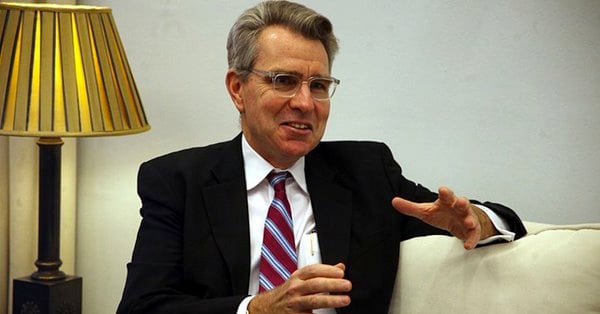
The prospect of the Vertical Corridor gas pipeline puts Greece in a leading position in energy security, U.S. Assistant Secretary for Energy Resources and former U.S. Ambassador to Greece Geoffrey Pyatt said in an interview posted on Sunday.
“Greece’s role is more important than ever, both in terms of its leadership on energy transition – the huge growth that’s happening in renewable energy production, wind and solar power but also in new areas like pure hydrogen – and its really, really important regional role,” Pyatt told AMNA journalist Sophia Papadopoulou.
Speaking from Washington, the official stated that the U.S. saw the gas pipeline as “a project that can be accomplished with very low capital expenditure, but will have a significant return on investment in terms of building energy security for the wider region.”
Greece as an energy gateway to the CEE
The Vertical Corridor would allow the transit of gas from Greece as a gateway to Central and Eastern Europe and Ukraine, and decouple the area from Russian energy supplies.
The floating storage regasification unit (FSRU) at Alexandroupolis is “already changing the geography of energy security in the Western Balkans and beyond,” Pyatt noted.
The State Department official had recently visited Athens for the REPowerEU Diversification Workshop by the European Commission and the Greek Environment and Energy Ministry on the Vertical Corridor project that aims to boost energy security and infrastructure in Southeast and Central Europe.
Pyatt’s main takeaway from his regional conversations in Athens was the importance of having the various transmission system operators, the gas transmission companies, working together to create what they call “a pancake tariff” so that there won’t be companies that want to take advantage of the Vertical Corridor or that have to pay separate tariffs at each stage of the process – which would make it uneconomical.
Greece’s potential role in the reconstruction of Gaza
In his interview, Pyatt also referred to the situation in the Middle East and said that once the violence in Israel, Lebanon, and Gaza ends, Greece could have an important role in the planning process for the day after in Gaza, including the energy sector.
He acknowledged that the main power station in Gaza, which has not been operational for several months, is managed by an Athens-based company, CCC.
“When we get to the task of rebuilding, everyone’s focus, including – I think – the Palestinians’, will be to build a future energy system that is cleaner and more sustainable. That is, more gas, more solar and wind power, and more renewables. Therefore, there is a natural role for Greece and Greek companies in this context. ADMIE already plays a leading role in the Great Sea Interconnector,” Pyatt opined.
American investments in Greece
Pyatt also spoke to AMNA about the prospect of boosting American investments in Greece. He made mention of the growth of the digital ecosystem in Greece and the investments by American giants AWS and Microsoft, stressing the country’s potential to become a regional digital hub.
There is also a big discussion in the United States about energy storage, according to Pyatt, which he has discussed a bit with Greek Prime Minister Mitsotakis’ team.
“I hope that we will see continued growth with US companies working in the areas of clean energy storage in Greece, because as Greece strengthens its wind and solar capacity, it will also have to invest in battery (energy) storage,” Pyatt argued.
“There are American companies, like Advent that are active in this field in Greece, and also in the United States, a company trading on NASDAQ. But you also have Sunlight, a battery company based in Thrace, which is also investing in battery production in the United States, taking advantage of the opportunities offered by the law to reduce inflation,” he added.



